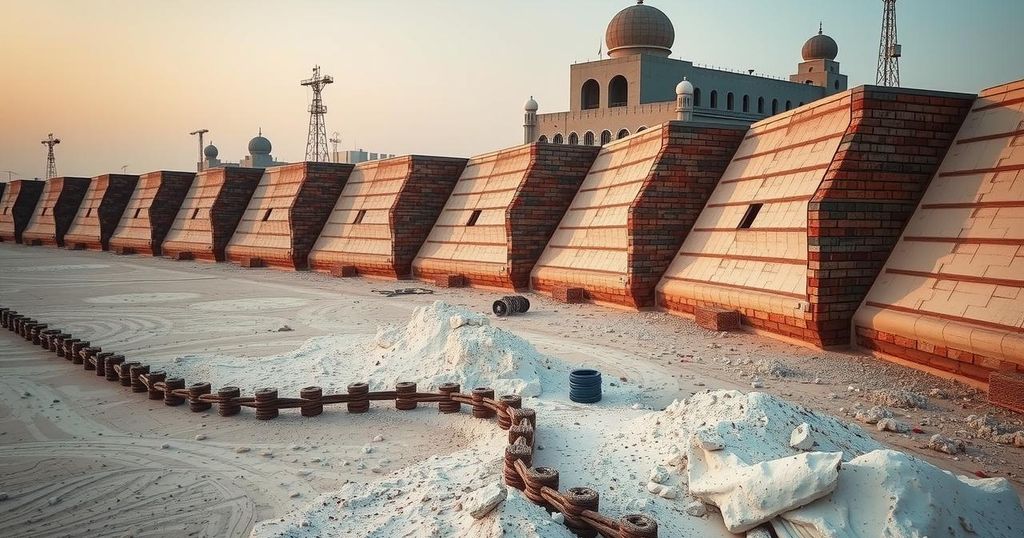Jordan Pursues Economic and Security Gains Through Engagement with New Syria

Jordan seeks to strengthen its economic and security position through renewed relations with Syria, focusing on reconstruction, border security, and energy collaboration. With a new inland port established and commitments to supply electricity, Jordan aims to leverage Syria’s recovery for mutual benefit, despite challenges related to military training and sectarian factions.
In the wake of the recent political shifts in Syria, Jordan has actively sought to establish a foothold in its neighbor to bolster its economy and enhance border security. Foreign Minister Ayman al-Safadi promptly convened with Syria’s new leader, Ahmed al-Sharaa, to address pressing issues like border integrity, drug trafficking, energy supplies, trade development, and the repatriation of Syrian refugees. The formation of joint committees signifies a mutual recognition of the necessity for cooperation between the two countries, particularly given their shared 378 km-long border.
Jordan’s strategic engagement aims to leverage Syria’s reconstruction efforts as an economic boon, transforming challenges into opportunities. For example, following a recent meeting, plans were unveiled for a new inland port in Mafraq to streamline logistics for reconstruction endeavors, thereby solidifying Jordan’s role in regional supply chains. This collaboration could generate investments, promote trade, and create jobs, aptly described by analyst Monther al-Hawarat as Jordan stepping in to support Syria’s recovery and institutional rebuilding, alongside providing critical energy resources.
Moreover, Jordan anticipates contributing significantly to Syria’s energy sector, willing to supply an estimated 250 megawatts of electricity, which could also facilitate electricity access for Lebanon. Beyond economic pursuits, Jordan’s efforts are intended to stabilize Syria, necessitating international support for the emerging governance structure in Damascus.
However, security concerns persist, particularly regarding arms and drug smuggling across the Jordan-Syria border. The new Syrian leadership has signaled confidence in overcoming these challenges, yet analysts stress the complexity of effectively managing border security amidst diverse factions operating within Syria. Previous training programs for Syrian opposition groups offer a glimpse into Jordan’s military engagement, yet analysts like Mamoun Abu Nuwar caution that restoring a cohesive Syrian military structure will demand considerable time and coordination, perhaps ultimately under Turkish supervision.
Overall, Jordan is poised to reshape its relations with Syria, navigating a path toward mutual benefit, while attempting to fortify its security and economic interests in a volatile region.
The geopolitical landscape in Syria has shifted dramatically following the overthrow of Bashar al-Assad by rebel forces, prompting neighboring Jordan to reevaluate its strategy in the region. Jordan shares a significant border with Syria and has been affected by the ongoing civil conflict, including issues such as drug smuggling and the influx of refugees. With Syria’s economy in ruins, Jordan perceives an opportunity not only to assist in reconstruction efforts but also to revive its own economy, which has suffered from prolonged regional instability. The implications of these developments extend beyond mere economic concerns; they also encompass security dynamics and international relations, particularly in light of Jordan’s historical alignment with Western policies and its relationship with Turkey, a key player in Syria’s civil conflict.
In summary, Jordan’s engagement with Syria represents a calculated effort to enhance both nations’ security and economic conditions in a post-conflict environment. The collaboration aims to address urgent issues such as border security and the reconstruction of Syrian infrastructure while benefiting from the economic opportunities presented by Syria’s recovery. However, the complexities of the Syrian military landscape pose challenges to achieving these goals, necessitating careful navigation of both local and international interests.
Original Source: www.middleeasteye.net








